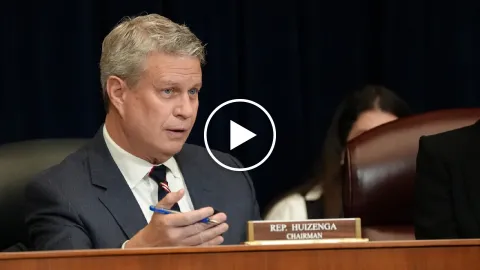South and Central Asia Subcommittee Chairman Bill Huizenga Delivers Opening Remarks at Hearing on Burma's Endless Crisis and America's Limited Options
WASHINGTON, D.C. – Today, House Foreign Affairs South and Central Asia Subcommittee Chairman Bill Huizenga delivered opening remarks at a subcommittee hearing titled "No Exit Strategy: Burma's Endless Crisis and America's Limited Options".

I've mentioned many times before in this committee, our foreign affairs committee, as well as the financial services committee, where I'm vice chair, that the Burma issues are near and dear to my heart, as well as the heart of my constituency, especially those constituents at the battle creek Burma center in southwest Michigan. That is what prompted me to really take a much more focused look at what is going on. And year after year, I've heard their stories and their desire for an end to the violence perpetuated by the junta. And they want to promote an open and inclusive democratic system and return to a safe and stable and secure Burma. And I know that's the goal of a few of our guests that are here in the audience with us today. And without objection, madam chair, I'd like to submit for the record a letter addressed to this committee, from more than 90 civil society organizations regarding the situation in Burma. They write in their letter it went to both the house foreign affairs committee as well as the senate foreign relations committee. "Burma's military has always been, and remains today, the single greatest source of instability and economic destruction in the country". Sadly, I think those words ring very true.
And unfortunately, since February 2021, when a military coup replaced the democratically elected government in Burma, these desires for a new Burma are a long way from being fully realized. Protests and general strikes from pro-democracy advocates led the military regime's indiscriminate crackdown, including the killing of protesters and previously elected leaders and airstrikes against schools, idp camps and civilian infrastructure, all of which manifests into human rights violations perpetuated by the oppressive and illegitimate military regime. The civil war between the military junta and the ethnic resistance organizations rages on, wreaking havoc across the country, and thanks to unfettered armed supply line from Russia and China, the military regime controls the airspace. And just last week, the military junta took delivery of Russian helicopters and Chinese military aircraft, which will ultimately be used to fight resistance forces and civilians in the mountainous regions of the country. The junta's grasp on its territory has become so desperate, the junta activated mandatory conscription last year, forcibly recruiting Rohingya muslims to fight on the regime's behalf or to use them as human shields, even as the regime has long persecuted the Rohingya themselves.
In the junta's latest ploy to build legitimacy around their illegitimate regime, a first of its kind election has been called for December 28th of this year, 2025. As co-chair of the congressional Burma caucus, I have significant concerns about the lack of electoral rules and structures in this deeply flawed process. Additionally, the enactment of a recent July 2025 election protection law targets anyone who speaks out or protests against the election and threatens years of imprisonment or even death for those that are convicted. This move only further chills the democratic process in Burma. To say that these elections are shaping up to be free or fair is delusional. Moving forward, the United States strong voice and stalwart leadership could have a lasting impact on the region.
I've frankly been encouraged by the Trump administration's interest in the region, including multiple rounds of sanctions designated from the treasury targeting Burmese armed groups with links to scam compounds, and a Burmese arms procurement network linked to North Korea. Additionally, since October, this administration has pledged over 130 million for the Rohingya refugee crisis and pushed 11 countries to increase their aid response to the Rohingya by more than 10%. In terms of assistance, the United States has provided more than a third of all aid to the Rohingya humanitarian crisis joint response plan in 2025, more than double than that of any nation. I see my time is running out. Um, but I just want to add again, um, I'm encouraged to see the July 2025 quad summit joint statement on being, bringing much needed international attention to the Burma crisis. More can and should be done by this administration and our global partners to stop the bleeding in Burma. So I look forward to our conversation today.